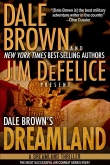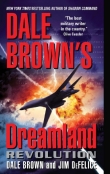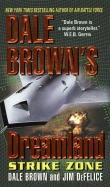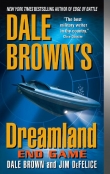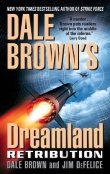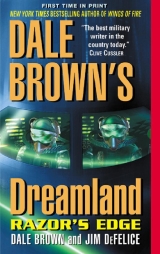
Текст книги "Razor's Edge"
Автор книги: Dale Brown
Жанр:
Боевики
сообщить о нарушении
Текущая страница: 2 (всего у книги 22 страниц)
“Major?”
“Keep your shirt on, Curly.”
Captain Kevin Fentress fidgeted at the nickname but said nothing. A reference to the short, well-furled locks on Fentress’s head, it was Zen’s latest attempt at giving the newbie Flighthawk pilot a decent handle.
“Handoff in thirty seconds,” said Zen. “Begin the procedure.”
“Right.” Fentress blew a hard breath, trying to relax. He was sitting only a few feet from Zen at the left-hand console in the Flighthawk control bay of Bear One, an EB-52
Megafortress outfitted to support test flights of the small, 22
DALE BROWN’S DREAMLAND
unmanned fighters, officially designated U/MF-3s. Taking over the robot wasn’t as simple as reaching over and grabbing the stick. Fentress’s fingers stumbled through the long panel sequence twice before he could give the voice command to transfer control to his console. The procedure included two different code words—a third, if Zen didn’t consent within five seconds—as well as retina scan by the gear in Fentress’s control helmet. By the time it was completed, the Flighthawk had traveled several miles beyond their planned turnaround and was nearing the end of the test range.
“Let’s go, Fentress. You’re behind the plane.”
“Yes, sir.”
“Tighter,” Zen told his pupil as he began the turn.
“You’re not flying a Predator. Use the plane.”
Fentress gave more throttle, still obviously out of sorts; he had to back off to get the robot’s nose onto the right heading. Zen knew how hard it could be to get a precise feel for the robot. It was as much a struggle of the imagination as anything physical. But Fentress had been practicing this for several days—he ought to know it cold.
Zen took another quick glance at the U/MF-3’s instrument readings, then looked at the sitrep map in the lower left video screen. The map presented a synthesized
“bird’s-eye view” of the area around Bear One, showing not only the unmanned robot, but its planned flight path and the location of the target drone, which in this case was an ancient Phantom F-4 flown completely by computer. Today’s exercise was simple: As the Phantom flew a racetrack oval around Dreamland’s Test Range 2, Fentress would approach it from the rear and launch a simulated cannon attack. It ought to be easy.
Except that Fentress overhandled the robot, his inputs shifting it left and right and up and down so much that the computer twice gave him warnings that the plane was RAZOR’S EDGE
23
dangerously close to pitching toward the dirt. Zen shook his head but let the computer do the scolding—the safety parameters were set so that C3 would take over if Curly did anything truly horrible.
Which he nearly did as he angled to catch the Phantom drone, swinging wide then overaccelerating and sailing over the plane without managing to get a firing cue from the computer.
“Try again,” said Zen as patiently as he could manage.
“Sorry.”
“Try again.”
Fentress did even worse the second time, violating the test parameters by flying into the next range, which fortunately was unoccupied. Zen grabbed control of the plane ten seconds after he crossed the line, overriding the usual command sequence with a push-button safety switch on his control board.
“Jesus, what’s going on?” said Fentress, at first un-aware that he didn’t have control.
“You went into Range 3B,” said Zen. “I have it.”
Zen slid his speed back and ducked the Flighthawk’s wing, gliding toward the designated airspace like an eagle checking the crags for a new aerie. He’d grown so used to flying the Flighthawk with his control helmet that handling it with the screens felt a little like backseat driving.
He pushed the Flighthawk into a rough trail on the drone, setting his speed precisely to the drone’s at 280 knots. All Fentress had to do now was nudge the slider on his throttle bar, located on the underside of the all-control stick, and wait for the “hit me” sign from the computer.
“All yours, Curly,” he said, punching his hot switch again to give control back.
His student hunkered down in his seat, pushing forward against the restraints as he concentrated. Zen watched the targeting screen count down as Fentress 24
DALE BROWN’S DREAMLAND
closed on the drone in a rear-quarter attack. The pilot pressed the trigger the second C3 cued him to fire.
And he’d been doing so well.
“I told you, the computer is almost always optimistic from the rear,” Zen told Fentress as the bullets trailed downward toward the empty desert. Oblivious, the Phantom began its turn, taking it outside the target cone.
“Count three before you fire.”
Firing the cannon—an M61 from an F-16 modified to fit the robot plane—killed some of the U/MF’s momentum, and Fentress struggled to get back into position. Finally he dropped his speed to the point where Zen worried the Phantom would lap him. Gradually, Fentress pulled himself toward the F-4’s tail. After nearly a half hour of nudging, he finally got the fire cue, waited this time, and then fired—only to see his target tuck its wing and disappear.
Not completely. It zipped up behind him as the Flighthawk’s RWR blared and nailed him from the back.
“Bang, bang, you’re dead,” said Zen, who had overrid-den the controls.
“That’s not fair,” said Fentress.
“Damn straight. Let’s try the whole deal again. Try and close a little faster, okay? We have to land while it’s still daylight.”
Megafortress Project Office
Megafortress Bunker, Dreamland
1745
CAPTAIN BREANNA “RAP” STOCKARD FOLDED HER FINGERS
into tight fists behind her back, controlling her anger as she waited for Major Nancy Cheshire to answer her question.
RAZOR’S EDGE
25
“I’m not saying you’re not fit for duty,” said Cheshire.
“What I’m saying is, you have to follow regulations like everyone else.”
“I’ve had my physical exam already,” said Breanna.
“I’m completely healed. What? You think I can’t fly? I’m rusty?”
“You have to follow procedures like everyone else on this base,” insisted Cheshire. “That means ten hours as copilot, and then a reevaluation.”
“And I can’t take Galatica.”
“Galatica is not cleared beyond the stage three static tests,” said Cheshire.
“Sure it is.”
“No, Breanna, the repairs covered more than forty percent of the airframe, and that’s not even counting what they’ve added. Rules are rules—that plane has a long way to go. They haven’t even painted the nose, and the radar hasn’t been replaced. Don’t worry—I’ll take good care of it.”
“The rules are bullshit,” said Breanna, pushing her fingers together. “That’s my plane.”
“The planes don’t belong to anyone, Breanna.”
“You’re only being a bitch to me because I’m a woman.
If it were Chris or Jerry, you’d cut them some slack.”
Breanna caught her breath, realizing what she’d said.
Major Cheshire didn’t react at all, which made Breanna feel even worse.
“You have a flight at 0500,” said Cheshire. “I would expect you might want to get some sleep.”
“Yes, ma’am.” Cheshire started to turn away. Breanna caught her sleeve. “I’m sorry, Nancy. I didn’t mean that. I didn’t.”
Cheshire nodded almost imperceptibly, then turned and walked from the simulator walkway.
Breanna hadn’t flown since crash-landing a Megafortress 26
DALE BROWN’S DREAMLAND
several weeks before. Her actions had won her an Air Force Cross—and a stay in the hospital for multiple injuries. But she’d just blown away the standard Megafortress simulations, proving she was fit to return to full duty.
In time, Breanna thought, to take Galatica up tomorrow for its first flight test after being repaired. She’d even be willing to take second seat if it meant flying her plane again.
Not that the planes belonged to anyone, exactly.
“Problem there, Captain?”
Breanna jerked around to find Clyde “Greasy Hands”
Parsons standing with a canvas tool bag a few feet from the ramp.
“No, I’m fine.”
“Ah, don’t let ’er get your goat, Captain. She’s always going around like she just stuck her butt in a power socket.” Parsons put his bag down and pulled a small tobacco tin from his pocket. He continued to speak as he wadded a tobacco plug into the side of his mouth. “She’s always looking to give someone a hard time’s all.”
“She’s doing her job, Chief,” said Breanna sharply.
Had she said that to any other chief master sergeant in the Air Force, the chief master sergeant would have snapped erect and walked on, undoubtedly cursing her under his breath. But Parsons and Breanna had been through a great deal together, and in fact the gray-haired chief liked to claim he’d been in the delivery room and pulled Breanna out from her mother’s womb.
An exaggeration, though not by much.
“You’re taking it all a bit hard, Bree,” said Greasy Hands gently. “Truth is, a lot of guys banged up like you were would take six months getting back, maybe more.”
“I wasn’t banged up.”
Banged up was what happened to her husband, a year RAZOR’S EDGE
27
and a half ago. That accident had cost him his legs—but not his career.
“You’re as stubborn as your old man. A real bee whacker,” said Greasy Hands, not without admiration. He started chewing his tobacco very deliberately.
“That’s a disgusting habit,” Breanna told him.
“Pretty much its main attraction.”
Breanna laughed as a small bit of tobacco juice drib-bled from his mouth.
“You’ll have a good flight tomorrow in Fort Two,” he said. “Garcia’s going along for the ride.”
“Oh no, not the Dylan freak!”
More tobacco squirted from Parsons’s mouth as he smirked. Garcia was one of Parsons’s best technical people, a whiz at both electrical and mechanical systems; supposedly he had once reassembled two turbofans blind-folded. But the staff sergeant was also an insufferable Dylan freak who saw fit to quote the master at every turn.
“Your dad wants everyone on the base to fly at least once a month. Garcia’s up,” said Parsons. “I told him not to touch nothin’ or you’d whack his fingers.”
“You did that on purpose,” Breanna told him. “You know I can’t stand Dylan.”
“Me? Never.”
Aboard Raven , over Dreamland Range 2
1620
IF THE MACHO WORLD OF FIGHTER JOCKS WAS EVER COMpared to a high school football team, Kevin Fentress would be the water boy. Maybe not even that. The short, skinny kid was also painfully shy, and hadn’t been the type to join teams or clubs in high school. In fact, most of his classmates would have been surprised to find he had 28
DALE BROWN’S DREAMLAND
gone to an Army recruiter one warm day toward the end of his junior year. Intelligent and very good with math, Fentress was hoping for a way to fund a college education. The recruiter spoke to him for a half hour before Fentress finally volunteered that his true wish was to fly aircraft. After a slight hesitation—and undoubtedly observing that the would-be recruit weighed less than an Al-ice pack—the soldier dutifully directed the young man to an Air Force sergeant down the hall. Fentress surprised the skeptical recruiter by blowing away not one, but three different aptitude tests. He eventually found his way into an ROTC program with high hopes of becoming a pilot.
He hadn’t, though, for a variety of reasons both complicated and uncomplicated. His tangled path through engineering and into robotics made sense if one kept in mind two things: the original aptitude scores, and the fact that in his whole history with the Air Force, Fentress had never expressed his personal wishes or desires to any superior officer. He had never questioned any order, let alone assignment, no matter how trivial. That alone meant he would never be a fighter jock—pilots seemed to have been bred to view orders not given under fire as optional requests.
Which did not mean that Fentress didn’t have personal wishes or desires. At the moment his dearest wish was to show his boss, Major Zen Stockard, that his selection as a pilot on the U/MF program—and the only pilot in the program besides Stockard—wasn’t a huge mistake.
“One last thing, Curly,” Zen said to him. “You have to always, always, always stay in the proper test range.” He clicked off the video replay of the test mission.
“Yes, sir.”
“You’re not flying a Global Hawk or a Predator,” added Zen, mentioning two other projects Fentress had worked on. “This is real stuff.”
RAZOR’S EDGE
29
“Yes, sir. I know. I’m sorry, sir.”
“Sorry doesn’t cut it.”
“Yes, sir. I know. I’m sorry.”
Fentress tried to bite the words back. Major Stockard embodied everything he’d once dreamed of becoming—he was a bona fide member of the Right Stuff gang, an F-15 jock who’d shot down an Iraqi jet during the Gulf War. Testing the Flighthawks, he’d survived a hellacious accident that had cost him the use of his legs. Though confined to a wheelchair, he had won his way back to active duty. Not only did he head the Flighthawk program, but he had seen action over Somalia and Brazil.
“We try again tomorrow,” added Zen, his voice still harsh.
“Yes, sir. I’ll do better. I promise. I can do better.”
“I suggest you hit the simulator.”
“I will. The whole night,” said Fentress.
“Not the whole fucking night, Curly. Get some sleep.”
“Yes, sir,” said Fentress. “I will.”
The major wheeled himself away, shaking his head.
Dreamland
1800
“SOME OF THE D BOYS WERE PRAYING, I SWEAR TO GOD.”
Danny laughed so hard he nearly dropped the phone. His wife Jemma made a little coughing sound in acknowledgment. He knew from experience that it meant she wanted to change the subject, but he was having too good a time to stop.
“You shoulda seen Russ, the helo pilot, when we landed. White as a ghost. And he’s blacker than me,”
added Danny. He stretched back on his plush but very 30
DALE BROWN’S DREAMLAND
worn gold chair so his head touched the bookcase. “And Peiler. Shit.”
“Peiler is which?”
“Major running the Delta Force squad we just finished the exercises with. Smug son of a bitch is going home with his tail between his legs. Top dogs, huh? We whomped ’em!”
“I can’t keep track of all these names,” said Jemma.
Her tone was absent, distant—further away than the nearly three thousand miles between them.
“So what’d you do today?” asked Danny, finally taking her hints.
“As a matter of fact, I had lunch with James Stephens.”
Her voice changed dramatically; suddenly she was all perky and enthusiastic. “You remember him? He worked for Al D’Amato and George Pataki.”
Big-time New York state politicians—D’Amato a senator and Pataki the governor. Jemma was a black studies professor at NYU and heavily involved in politics; she was always dropping names of big shots.
“They’re Republicans,” she added. “Conservative Republicans.”
“And?”
“Jim Stephens is a good man to know,” she said. “He believes African-Americans need to be more involved.
And it’s a good time. A time when things can be done.”
“Yeah? So when are you running?” Danny asked, reaching for his drink on the table—lime-flavored seltzer.
“Not me. You,” she said sharply. “War hero. Conservative. Man of color.”
“Who says?” said Danny.
“You’re conservative.”
“Who says I’m a war hero?” He didn’t necessarily con-
RAZOR’S EDGE
31
sider himself conservative, either. Nor liberal, for that matter.
Hell, he wasn’t even comfortable with “man of color.”
“Come on, Daniel. Give yourself some credit. You would be an excellent congressman. From there, who knows?”
Danny rolled his eyes but said nothing. They’d had conversations along this line two or three times before. At some point he thought he might want to work for or in the government somehow; a lot of service guys ended up there. But as far as politics was concerned, he didn’t think he could manage the bullshitting.
“I want you to talk to him,” said Jemma. “I gave him your phone number.”
“What?”
“The general line, routed through Edwards,” said Jemma quickly. “Don’t worry. I was vague on your assignment, as per instructions.”
“Jem, I really don’t want—”
“You can’t stay in the Air Force forever, Danny. You have to think about your future.”
“Right now?”
“Yes, now—you have to think about us.”
“I do think about us,” he said, and had an impulse to throw down the phone, grab a flight to New York, race to the small apartment she rented near campus, and throw himself on top of her.
Not that that would solve anything. It’d feel good, though.
“You have responsibilities,” she said, back in her professor’s voice. “Responsibilities to our people.”
Jemma really did believe in cultural and societal responsibility, but generally when she started talking about it, she was skirting some issue between them.
32
DALE BROWN’S DREAMLAND
“I miss you a lot,” he told her.
“Me too,” she said. “I saw little Robert today.”
“How are they?” Danny tried not to let the wince get into his voice. Little Robert was the cuter-than-hell two-year-old son of a friend of theirs who lived near Jemma.
His father had served with Danny in the Air Force, leaving to take a job in the city as an investigator for the SEC.
“They’re great. He called me Auntie,” she said. “I like it.”
“You feeling those urges, Jem?”
“What? For a kid? No way. No way.”
They talked for a while more. When Jemma brought up Stephens again, he agreed to at least talk to him.
“Don’t go back on your word,” she said. “I’ll know.”
“All right, baby, I won’t.” As he hung up the phone, the urge to go to her was so strong that he got up and decided to hit the gym before dinner.
Melcross, Nevada (outside Las Vegas) 1900
THE RESTAURANT ADVERTISED ITSELF AS HANDICAPPED AC-cessible, but like most places, the advertisement fell far short of the reality. The first barrier was a two-inch rise at the curb from the parking lot—not a great deal, certainly, and not the biggest bump Zen Stockard had even faced that day, but it was an annoying precursor of what lay ahead. The front entrance sat behind three very high and shallow steps; Zen had to wait outside as his wife went in to ask that the side door be unlocked. That was at the end of a tight ramp, and Jeff had to maneuver through the door and into the narrow hall with a series of pirouette re-versals that would have been difficult for a ballerina, let alone a man in a wheelchair. Getting into the dining room RAZOR’S EDGE
33
involved passing through the kitchen; Zen was almost smacked in the face by a waitress carrying a tray full of fancy spaghetti. On a different day, he might have laughed it off with a joke about not wanting his calamari in his lap, but tonight he was in a foul mood and just barely managed not to complain when the kitchen door smacked up against his rear wheel as he passed onto the thick carpet of the eating area.
It was no wonder many disabled people thought A.B.’s—the abbreviation stood for “able bodied” and was not necessarily benign—had it in for them. It wasn’t a matter of being different; that was something you could accept, or at least view as a necessary condition. It was more the smiley stares that accompanied the bumps and turns, the “look at all I’ve done for you and you’re still bitchin’ at me?” attitudes.
“We’d like a better table,” said Zen as the maitre d’
showed them to a small, dim spot at the back, basically hiding them from the rest of the clientele.
“Jeff—”
“How about that one,” Zen said, pointing toward the front of the room.
It was a challenge, and the maitre d’ knew it. But give the man credit—despite his frown, he led them there.
“You really want to sit up here?” Breanna asked. “It’s going to be right in a draft.”
“I like drafts,” said Zen.
“And I thought I was in a bad mood.”
“I’m just hungry.” He took the menu.
“Wine?” Breanna asked.
“Beer.”
“I doubt they have anything you like,” she said, glancing around the fancy Italian restaurant.
Her prediction proved incorrect, as there were several 34
DALE BROWN’S DREAMLAND
relatively good brews on tap, including the Anchor Steam that Zen opted for. But even that failed to lift his mood.
“Happy anniversary,” said Breanna, holding up her glass—a reserve Chianti from Antinori that she pro-nounced “perfect.”
“Anniversary of our first date,” said Zen, clicking the glass gently. “If it was really a date.”
“A date is a date is a date. Boy, you are in a bad mood,”
said his wife. She took a long sip from her glass. “I should have ordered a whole bottle.”
“Hmmph.”
“Fentress did bad today, huh?”
“He’s lucky I don’t wash him out.”
“Oh, come on, I saw him fly yesterday. He wasn’t that bad.”
Zen took up his menu, trying to decide between the gnocchi with pesto or one of the ten thousand spaghetti choices.
“You said yourself there’d be a transition,” said Breanna.
“I was optimistic.”
“Jeff—sooner or later, there are going to be other pilots in the program.”
“You think I’m giving him a hard time on purpose?”
Breanna gave him one of her most severe frowns—her cheeks shot inward and her brow furrowed down—before pretending to study the menu.
Zen didn’t consider Fentress a bad sort, really; he was smarter than hell, with an engineering degree and several published papers on complicated computer compressions that Jennifer Gleason said were quite good. But he also had a certain lapdog quality to him, an I’ll-do-anything-you-want thing that irked Zen.
Plus he’d screwed up on the flight today.
RAZOR’S EDGE
35
So had he, Zen knew, on his first few flights.
Still, the kid—he was a kid, not even twenty-five yet—pissed him off.
Fentress wanted his job. He’d said something like that the first day they met, during one of the bullshit orientation “talks,” actually an informal job interview.
Still, he had gone ahead and selected Fentress for the program anyway. What the hell was he thinking?
That Curly was better than one of the jocks who wanted his job.
Less threatening?
Bullshit.
“You havin’ fish?” Zen asked his wife.
“With Chianti? No,” said Bree.
The waiter approached. “Buona sera,” he said, using Italian to say good evening.
It was the sort of thing Breanna ate up. “Buona sera,”
she replied lightly. “Per piacere, un po’ d’acqua fresco,”
she said, asking for water, then added in Italian that he could bring it later, after they ordered.
The waiter treated her like a long lost cousin. They began debating the merits of several dishes. Zen watched sourly. He loved Bree—truly he did—but she could act like such a jerk sometimes. He wouldn’t have been surprised to see her get up and start dancing with the buffoon.
Finally the waiter turned toward him. “E signor?”
“Yeah, spaghetti,” said Jeff.
“Just spaghetti?” asked the waiter.
“Yuppers.”
The man took the menu and retreated quickly.
“You know, you used to be fun,” said Breanna.
She meant it as a joke, but there was something serious behind it.
“When I walked, right?” he snapped.
36
DALE BROWN’S DREAMLAND
“Jeff—baby, that’s not what I meant. Jeffrey. Jeff.” She reached her hand across the table and gently touched his face. “Are you okay?”
“I’m all right,” he said.
“Jeff.”
She rubbed her forefinger lightly against his cheek.
He tried to will away the anger and resentment, realizing that, of all people, she shouldn’t bear the brunt of it.
He remembered her face on the stretcher a few weeks ago when they’d come back from Brazil. She’d crash-landed the plane after saving them from an altimeter bomb.
He’d said a prayer then, probably the first he’d uttered since his own crash.
“Don’t let her be crippled,” he’d prayed. “It would be better for her if she died.”
He’d meant it.
“Jeff?”
“I’m sorry, Bree,” he said. “Bad day. I’m just—just a tough day. You going to give me some of your veal?”
“I ordered braised lamb in a port reduction sauce with sorrels and shaved truffles.”
“Yeah, that’s what I meant,” he said.
Incirlik Air Base, Turkey
27 May
0413
THE HOUR OF SLEEP TORBIN CAUGHT AFTER THE LENGTHY
mission debrief had served only to increase his restlessness. He came back to the base and wandered back and forth between his ready room and the hangar area, alternately checking on his aircraft and plans for a morning mission. The downed pilot hadn’t been found yet, but RAZOR’S EDGE
37
they now had a fix on the wreckage of his plane. Two planes were orbiting the area and a full-blown search package would launch a half hour before first light.
Torbin planned to be in it, even if he had to fly Glory B
himself.
The debriefers had grilled him pretty hard about the Iraqi missile sites. Their questions were nothing compared to the single one he’d asked himself over and over since the Falcon had been hit:
How the hell had he missed the missile?
The answer was that he hadn’t. The Iraqis had fired a bunch of missiles from long range without guidance, and somehow, some way, they had gotten the F-16.
Nailed it. Clipped the sucker. Waxed his fanny.
But there was no way, no way in the world, that it had been one of the missiles he’d had on his gear. Not possible.
The APR-47 threat detection radar was an extremely capable piece of equipment—old, perhaps, but still a notch ahead of anything Iraq possessed. Assuming it was in operating order—and the technicians who swarmed over it after they landed assured him it was—the APR-47
could not have missed any Iraqi radar, certainly not one operating long enough or close enough to successfully target the plane.
Nor could he, Torbin thought.
Somehow the bastards had claimed the plane with a one in a million blind shot. Though he wasn’t even sure how they could have managed that.
Torbin folded his arms against his chest as he walked toward Glory B’s hangar. Possibly, the F-16 pilot had screwed up. Possibly. Still, he was pissed—he wanted to pound those bastards into the sand with his bare fists.
A Humvee barreled toward him as he turned the corner toward the maintenance area; he frowned at it viciously, 38
DALE BROWN’S DREAMLAND
as if that might make it miss him, then stepped off the macadam as the truck veered to a stop.
“Captain Dolk?” asked the driver, who was wearing civilian clothes.
“Yeah?”
“Hop in.”
“Who the hell are you?”
“My name’s Smith,” said the driver. “Come on.”
“Hey, no offense, but I’ve got a mission to prep.”
“Just get in,” said the driver.
A figure leaned forward from the rear. “Relax, Captain,” the man told him. “My name is Brad Elliott. General Elliott. I’d like to speak to you for just a second. We’ll give you a lift to wherever it is you’re going.”
“I have a mission, sir,” said Torbin.
“We won’t interfere with that.”
Torbin shrugged, then stepped around the vehicle to get in the other side. Elliott opened the door for him. He too was wearing civilian clothes.
“I gave a full briefing when I landed, sir,” said Torbin.
“Yes, we’ve seen the preliminary report and spoken to Colonel Hashek,” said Elliott. “I’d like to hear what happened in your own words.”
Torbin sighed. This figured to be a big fucking deal, even if they got the pilot back—no one had been shot down over Iraq since the Gulf War.
“A lot of flicks on and off,” said the general, summarizing the incident after Torbin finished. “And then a barrage of missiles.”
“Pretty much,” said Torbin. “Everything was out of range, except for that SA-2 site that I nailed. And maybe the SA-8. We hit both. The tapes bear me out.”
Elliott nodded. The driver had turned around at some point during the story; Torbin looked now into his face.
Even in the darkness he could see the frown.
RAZOR’S EDGE
39
“I have a job to do this morning, sir,” said Torbin.
“Understood,” said Elliott. “One more thing—did you see the missile that hit the F-16?”
“No, sir. We weren’t that close to the fighters and, uh, my eyes would have been on the scope at that point, sir.”
“I wasn’t implying they weren’t,” said the general mildly. “Can you think of anything else?”
“No, sir.”
“That’s fine,” said the general. “Thank you, son.”
“Yes, sir.”
Torbin got out of the vehicle. Before he closed the door, the general leaned toward him across the seat.
“Don’t worry about what happened yesterday,” Elliott told him. “Just do your best this morning.”
“Yes, sir,” said Torbin. “That’s what I figure.”
He closed the door, stood back and saluted as the Hummer sped off.
“WHAT DO YOU THINK, MACK?” ASKED GENERAL ELLIOTT
as Major Smith geared the Hummer toward the command buildings.
“He blew it big-time and doesn’t want to admit it,” said Mack. When Elliott didn’t answer, he added, “That’s only my opinion.”
“Understood.”
“Maybe there was a gear screw-up,” said Mack. “Or maybe the Viper flew into flak and the other guys on the flight just got his altitude wrong. Things get tangled. It could even have been a shoulder-launched SA-14,” he added, though he thought all of those possibilities were fairly remote. “Just got lucky.”
“Possible.”
“Say, General, I want to be on the mission. Hook me up with one of the F-16s. I’ll find him. I promise.”
“We have our own job to do, Major.”
40
DALE BROWN’S DREAMLAND
“No offense, General, but you can snag an airman to do your driving. Hell, I’m a better pilot than any of these guys. You know it, sir.”
“Mack, you haven’t changed one bit.”
“Thank you.”
“I didn’t mean that as a compliment.”
Mack steered the Hummer into a parking spot near the small, squat building headquartering the squadron in charge of the operations. Elliott jumped out, breezing by the air policemen and striding into the building. Mack followed along as Elliott headed back to Colonel Hashek’s office. By the time Mack caught up, Hashek was already laying out the game plan for the morning search and rescue mission.
“I have a pair of MH-53 Pave Lows at this forward area here,” he said, jabbing at a large topo map showing southeastern Turkey and northwestern Iraq. “They’ll wait at this old airstrip in the mountains. From there they can jump into Iraqi territory in two minutes, maybe less. I’m going to bring in a Combat Talon and fly it back and forth over the wreckage—if that radio comes up, he’ll hear it.”
“He’ll also be a sitting duck,” said Elliott. The Combat Talon was a specially modified MC-130E Hercules, a four-engine aircraft designed to fly over hostile territory.
Despite its many improvements, it was unarmed, relatively slow, and would be exceedingly vulnerable, especially during the day.
“I need ears,” said Hashek. “And that old Herk has to be very close. Now the plane you came in—”
“It’s not my plane, so it’s not my call,” said Elliott.
“But frankly, it’s not worth the risk.”
Mack had been thinking along the same lines as the colonel, and was nearly as surprised as Hashek at Elliott’s response. Granted, the converted 707 carried a wide range of highly sensitive electronic spy equipment, most RAZOR’S EDGE

